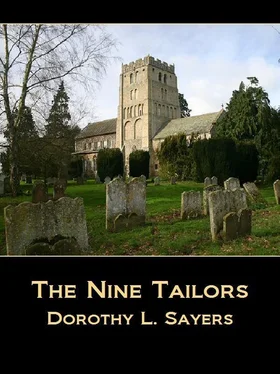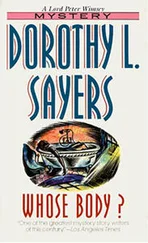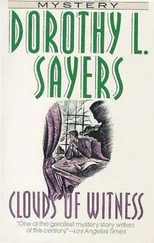Dorothy Sayers - The Nine Tailors
Здесь есть возможность читать онлайн «Dorothy Sayers - The Nine Tailors» весь текст электронной книги совершенно бесплатно (целиком полную версию без сокращений). В некоторых случаях можно слушать аудио, скачать через торрент в формате fb2 и присутствует краткое содержание. Жанр: Классический детектив, на английском языке. Описание произведения, (предисловие) а так же отзывы посетителей доступны на портале библиотеки ЛибКат.
- Название:The Nine Tailors
- Автор:
- Жанр:
- Год:неизвестен
- ISBN:нет данных
- Рейтинг книги:3 / 5. Голосов: 1
-
Избранное:Добавить в избранное
- Отзывы:
-
Ваша оценка:
- 60
- 1
- 2
- 3
- 4
- 5
The Nine Tailors: краткое содержание, описание и аннотация
Предлагаем к чтению аннотацию, описание, краткое содержание или предисловие (зависит от того, что написал сам автор книги «The Nine Tailors»). Если вы не нашли необходимую информацию о книге — напишите в комментариях, мы постараемся отыскать её.
The Nine Tailors — читать онлайн бесплатно полную книгу (весь текст) целиком
Ниже представлен текст книги, разбитый по страницам. Система сохранения места последней прочитанной страницы, позволяет с удобством читать онлайн бесплатно книгу «The Nine Tailors», без необходимости каждый раз заново искать на чём Вы остановились. Поставьте закладку, и сможете в любой момент перейти на страницу, на которой закончили чтение.
Интервал:
Закладка:
“Suppose Deacon was being fed by somebody,” said Wimsey, “and suppose he said something infuriatin’ and the somebody killed him all of a sudden in a frenzy, not meaning to?”
“Yes, but how did he kill him? He wasn’t stabbed or shot or clouted over the head.”
“Oh, I don’t know, ” said Wimsey. “Curse the man! He’s a perfect nuisance, dead or alive, and whoever killed him was a public benefactor. I wish I’d killed him myself. Perhaps I did. Perhaps the rector did. Perhaps Hezekiah Lavender did.”
“I don’t suppose it was any of those,” said Mr. Blundell, stolidly. “But it might have been somebody else, of course. There’s that Potty, for instance. He’s always wandering round the church at night. Only he’d have to get into the bell-chamber, and I don’t see how he could. But I’m waiting for James. I’ve got a hunch that James may have quite a lot to tell us.”
“Have you? Oysters have beards, but they don’t wag them.”
“If it comes to oysters,” said the Superintendent, “there’s ways and means of opening ’em — and you needn’t swallow ’em whole, neither. You’re not going back to Fenchurch?”
“Not just at present. I don’t think there’s very much I can do down there for a bit. But my brother Denver and I are going to Walbeach to open the New Cut. I expect we shall see you there.”
* * *
The only other thing of interest that happened during the next week or so was the sudden death of Mrs. Wilbraham. She died at night and alone — apparently from mere old age — with the emeralds clasped in her hand. She left a will drawn up fifteen years earlier, in which she left the whole of her very considerable estate to her Cousin Henry Thorpe “because he is the only honest man I know.” That she should cheerfully have left her only honest relative to suffer the wearing torments of straitened means and anxiety throughout the intervening period seemed to be only what anybody might have expected from her enigmatic and secretive disposition. A codicil, dated on the day after Henry’s death, transferred the legacy to Hilary, while a further codicil, executed a few days before her own death, not only directed that the emeralds which had caused all the disturbance should be given to “Lord Peter Wimsey, who seems to be a sensible man and to have acted without interested motives,” but also made him Hilary’s trustee. Lord Peter made a wry face over this bequest. He offered the necklace to Hilary, but she refused to touch it; it had painful associations for her. It was, indeed, only with difficulty that she was persuaded to accept the Wilbraham estate. She hated the thought of the testatrix; and besides, she had set her heart on earning her own living. “Uncle Edward will be worse than ever,” she said. “He will want me to marry some horrible rich man, and if I want to marry a poor one, he’ll say he’s after the money. And anyway, I don’t want to marry anybody.”
“Then don’t,” said Wimsey. “Be a wealthy spinster.”
“And get like Aunt Wilbraham? Not me!”
“Of course not. Be a nice wealthy spinster.”
“Are there any?”
“Well, there’s me. I mean, I’m a nice wealthy bachelor. Fairly nice, anyway. And it’s fun to be rich. I find it so. You needn’t spend it all on yachts and cocktails, you know. You could build something or endow something or run something or the other. If you don’t take it, it will go to some ghastly person — Uncle Edward or somebody — whoever is Mrs. Wilbraham’s next-of-kin, and they’d be sure to do something silly with it.”
“Uncle Edward would,” said Hilary, thoughtfully.
“Well, you’ve got a few years to think it over,” said Wimsey. “When you’re of age, you can see about throwing it into the Thames. But what I’m to do with the emeralds I really don’t know.”
“Beastly things,” said Hilary. “They’ve killed grandfather, and practically killed Dad, and they’ve killed Deacon and they’ll kill somebody else before long. I wouldn’t touch them with a barge-pole.”
“I’ll tell you what. I’ll keep them till you’re twenty-one, and then we’ll form ourselves into a Wilbraham Estate Disposals Committee and do something exciting with the whole lot.”
Hilary agreed; but Wimsey felt depressed. So far as he could see, his interference had done no good to anybody and only made extra trouble. It was a thousand pities that the body of Deacon had ever come to light at all. Nobody wanted it.
* * *
The New Wash Cut was opened with great rejoicings at the end of the month. The weather was perfect, the Duke of Denver made a speech which was a model of the obvious, and the Regatta was immensely successful. Three people fell into the river, four men and an old woman were had up for being drunk and disorderly, a motor-car became entangled with a tradesman’s cart and young Gotobed won First Prize in the Decorated Motor-cycle section of the Sports.
And the River Wale, placidly doing its job in the midst of all the disturbance, set to work to scour its channel to the sea. Wimsey, leaning over the wall at the entry to the Cut, watched the salt water moving upward with the incoming tide, muddied and chafing along its new-made bed. On his left, the crooked channel of the old river lay empty of its waters, a smooth expanse of shining mud.
“Doing all right,” said a voice beside him. He turned and found that it was one of the engineers.
“What extra depth have you given her?”
“Only a few feet, but she’ll do the rest herself. There’s been nothing the matter with this river except the silting of the outfall and the big bend below here. We’ve shortened her course now by getting on for three miles and driven a channel right out into the Wash beyond the mudbanks. She’ll make her own outfall now, if she’s left to herself. We’re expecting her to grind her channel lower by eight or ten feet — possibly more. It’ll make all the difference to the town. It’s a scandal, the way the thing’s been let go. Why, as it is, the tide scarcely gets up higher than Van Leyden’s Sluice. After this, it’ll probably run up as far as the Great Leam. The whole secret with these Fen rivers is to bring back all the water you can into its natural course. Where the old Dutchmen went wrong was in dispersing it into canals and letting it lie about all over the place. The smaller the fall of the land, the bigger weight of water you need to keep the outfall scoured. You’d think it was obvious, wouldn’t you? But it’s taken people hundreds of years to learn it.”
“Yes,” said Wimsey. “I suppose all this extra water will go up the Thirty-Foot?”
“That’s right. It’s practically a straight run now from the Old Bank Sluice to the New Cut Outfall — thirty-five miles — and this will carry off a lot of the High Level water from Leamholt and Lympsey. At present the Great Leam has to do more work than it should — they’ve always been afraid to let the Thirty-Foot take its fair proportion of the flood-water in winter, because you see, when it got down to this point it would have overflowed the old riverbed and drowned the town. But now the New Cut will carry it clean off, and that will relieve the Great Leam and obviate the floods round Frogglesham, Mere Wash and Lympsey Fen.”
“Oh!” said Wimsey. “I suppose the Thirty-Foot Dyke will stand the strain?”
“Oh, dear, yes,” said the engineer, cheerfully. “It was meant to from the beginning. In fact, at one time, it had to. It’s only within the last hundred years that the Wale has got so badly silted up. There’s been a good deal of shifting in the Wash — chiefly owing to tidal action, of course, and the Nene Outfall Cut, and that helped to cause the obstruction, don’t you see. But the Thirty-Foot worked all right in the old days.”
Читать дальшеИнтервал:
Закладка:
Похожие книги на «The Nine Tailors»
Представляем Вашему вниманию похожие книги на «The Nine Tailors» списком для выбора. Мы отобрали схожую по названию и смыслу литературу в надежде предоставить читателям больше вариантов отыскать новые, интересные, ещё непрочитанные произведения.
Обсуждение, отзывы о книге «The Nine Tailors» и просто собственные мнения читателей. Оставьте ваши комментарии, напишите, что Вы думаете о произведении, его смысле или главных героях. Укажите что конкретно понравилось, а что нет, и почему Вы так считаете.












